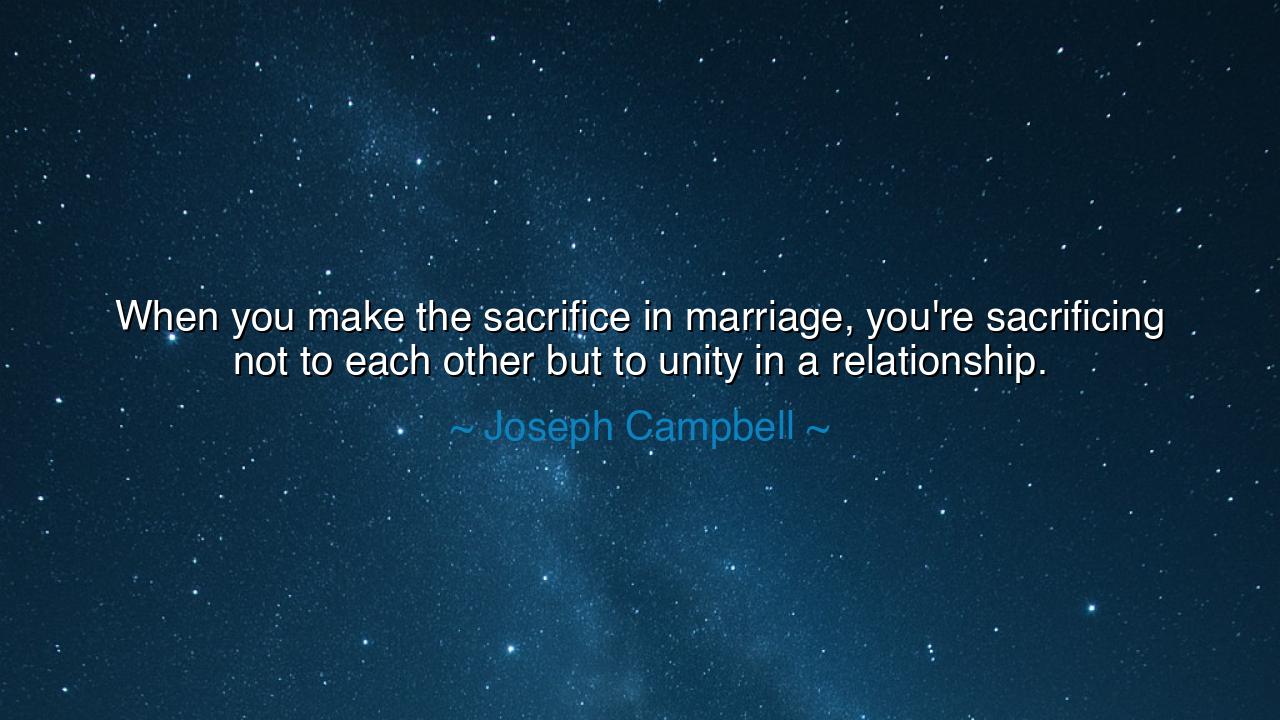
When you make the sacrifice in marriage, you're sacrificing not
When you make the sacrifice in marriage, you're sacrificing not to each other but to unity in a relationship.






In the sacred union of marriage, Joseph Campbell reminds us that the essence of sacrifice is not the surrendering of oneself to another, but the surrendering of two egos to a greater unity. When he said, “When you make the sacrifice in marriage, you're sacrificing not to each other but to unity in a relationship,” he spoke as a mythologist who saw human love through the eyes of ancient heroes. In myth and legend, the greatest acts of devotion are not about pleasing one’s beloved, but about maintaining harmony with the divine law of oneness — the union of opposites that gives life its balance. So it is in marriage: each act of giving up pride, of yielding to understanding, becomes an offering not to the partner, but to the invisible temple that is the relationship itself.
Campbell understood marriage as a spiritual journey — an initiation into the mystery of two souls learning to breathe as one. He studied the rituals of tribes and civilizations where marriage was seen not merely as a contract, but as a covenant sanctified by the gods. In those traditions, when two people joined, they created something larger than themselves — a third entity, a sacred bond that required nourishment through sacrifice, patience, and humility. Thus, when one forgives, when one yields, when one chooses understanding over ego, it is not weakness but worship — an offering to that unity.
Consider the story of Marcus Aurelius and Faustina, the Roman emperor and his empress. Though history records their tempests — her infidelities, his burdens of empire — Aurelius never ceased to honor her as part of the divine order of his life. In his Meditations, he never speaks of resentment, only of acceptance and discipline in love. He knew that to preserve the sanctity of union, one must sometimes bow not to the other, but to the ideal of harmony that binds them. His was a sacrifice not of subservience, but of self-conquest — the noblest kind.
The ancients knew that unity is not born of similarity but of contrast made whole. The sun and moon do not compete; they serve the same sky. In the same way, two individuals in love are not meant to merge into sameness, but to coexist in sacred difference — each surrendering the illusion of absolute independence to protect the rhythm of their shared world. Sacrifice in this sense is not loss; it is transformation — the burning of ego to light the hearth of union.
In our age, love too often becomes a negotiation of desires, a ledger of what one gives and what one gains. But true marriage, Campbell teaches, is not a transaction — it is an act of creation. Every time you set aside pride to listen, every time you hold peace instead of victory, you are not yielding to your partner’s will; you are serving the spirit of oneness. The relationship becomes a living being, a shared soul that survives the tempests of emotion and time because both have chosen to honor it above themselves.
We may also recall the tale of Ruth and Boaz from ancient scripture — a story of loyalty and faith. Ruth, widowed and destitute, refused to abandon her mother-in-law, saying, “Where you go, I will go.” Her sacrifice was not to a person, but to love’s higher unity — the commitment to a bond greater than comfort. From that selflessness, a lineage was born that led to kings. Her devotion shows that when one offers themselves to unity, destiny responds with grace.
The lesson here is both simple and profound: in love, the enemy is not your partner’s flaw, but your own ego’s demand to prevail. The true strength of marriage lies not in dominance, but in the willingness to sacrifice for unity — to guard the harmony even when emotion rages. The wise do not ask, “Who wins this quarrel?” but rather, “Does love remain unbroken?”
So, let this be your practice: each day, remember that you are two servants of the same flame. When anger rises, serve peace. When pride speaks, listen instead. When hurt tempts you to withdraw, offer kindness. For every such act is a stone laid in the eternal temple of love. In the end, as Campbell taught, the truest offering in marriage is not to each other, but to the unity that makes you both divine.






AAdministratorAdministrator
Welcome, honored guests. Please leave a comment, we will respond soon